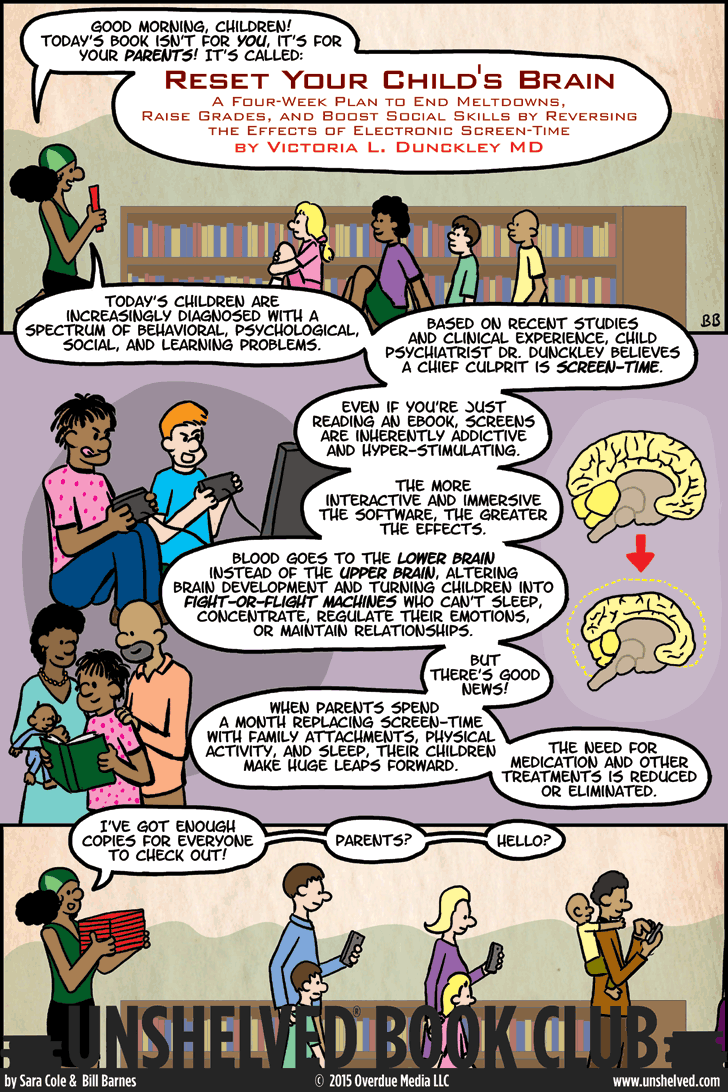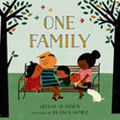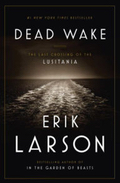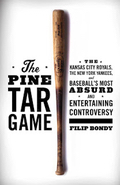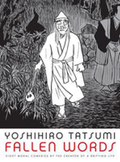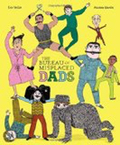Link to this review in the form of a comic strip by saracole tagged science
Link to this review by geneambaum tagged picture book
This counting book reminds kids that a thing (a bowl of pears, a pile of pups) or a family can be made up of different numbers of very different people, and that we’re all one family living on one world.
Why I picked it up: George Shannon is a picture book writer who is also a children’s librarian on Bainbridge Island near Seattle (where I live).
Why I finished it: I loved Gómez’s pictures, which have hidden depths. There are textures everywhere, from people’s complexions to the hardwood floors to the amazing way she draws trees and bananas and water. It’s fun to look at each page again and again.
Readalikes: Dušan Petričić’s My Family Tree and Me, a picture book about a boy whose family tree includes a European side and an Asian side.
Link to this review by diane tagged history
On May 1, 1915, the luxury ocean liner Lusitania was hit by a torpedo fired by a German submarine. The ship sank and almost 1200 people lost their lives, including 128 Americans. The sinking is considered the incident that drew the United States into World War I. Larson looks at the events leading up to that fateful night, profiling many of the passengers and crew of both the Lusitania and Unterseeboot-20, the German sub that fired the torpedo.
Why I picked it up: Although my history classes in school mentioned the sinking of the Lusitania as a pivotal event leading up to WWI, the human side of the event was never discussed. I thought it would good to learn more about the people involved.
Why I finished it: As expected, Larson’s narrative puts a human perspective on this tragedy. Despite many warnings about British ships being the targets of German u-boats, passenger ships continued their voyages. The details of passengers’ lives in the weeks leading up to the sailing make the story more poignant and heartbreaking. Once the ship is attacked and starts to sink, who survives (and who does not) had a strong emotional impact on me — these were real people, not just numbers. It was also a thought-provoking opportunity to learn more about the German side of the story, and to see what historic figures like Woodrow Wilson and Winston Churchill were thinking and doing prior to the sinking.
Readalikes: In the Garden of Beasts: Love, Terror, and an American Family in Hitler’s Berlin, also by Erik Larson. It’s the story of the American ambassador to Germany in the late 1930s and early 1940s — the parties, the romances, and the human side of the build-up to World War II. Who knew that the American ambassador’s daughter had an affair with a Gestapo leader?
Link to this review by flemtastic tagged nonfiction
When Colin Powell named Abu Musab al-Zarqawi as one of the main targets in the fight against terrorism, he launched the career of the man who is credited with bringing the Islamic Caliphate and ISIS. A former compatriot of Osama bin Laden, Zarqawi refused to pledge fealty to bin Laden and delivered his own fiery speeches via the internet. Many believe that he was more bloodthirsty than bin Laden and made a bigger impact. He personally beheaded Nick Berg, an American freelance radio-tower repairman who was kidnapped while working in Iraq, which was a new escalation in graphic violence. Although Zarqawi was killed in an American air strike in 2006, his legacy lives on in the movement that is now destabilizing countries in the Middle East (Syria and Iraq in particular).
Why I picked it up: I heard an interview with the author on NPR’s Morning Edition. With ISIS all over the news daily, and the recent escalation in Russian involvement, I thought I should read more about it.
Why I finished it: Zarqawi was quite a compelling, simple, and barbaric man. He was straighforward and literal, and saw the world in the strictest black and white. For example, he had several tattoos from before his conversion to Islam. These were forbidden to him so, after an attempt to bleach them off failed, he had a friend use a razor to slice away his skin without anesthesia.
At the beginning of the book, when he was in a Jordanian prison, he had a respected religious advisor who kept him under control. After he established his terrorist bona fides with bombings and beheadings, he started shunning his teacher’s guidance and making religious decrees on his own despite the fact that he hadn’t studied the Koran.
It’s perfect for: I’d like to give it to my neighbor, who makes all kinds of stupid postings on Facebook about Islam and sees all Muslims as potential terrorists. After reading this he would understand the radical brand of Islam that Zarqawi was peddling and why it was so attractive to young, disaffected men. I hope that he will see that ISIS leaders are misinterpreting parts of the Koran to justify their actions, and that he might differentiate between those who believe in Islam and who choose violence.
Link to this review by emilyreads tagged nonfiction • history
Sportswriter Bondy offers the ins, outs, and in-betweens surrounding the July 24, 1983 Royals-Yankees game that ended in chaos after hotheaded Yankees manager Billy Martin accused Royals star George Brett of having too much pine tar on his bat, thereby erasing Brett’s game-winning home run off Yankees ace Goose Gossage. It’s as much a psychological treatise as a sports story as Bondy delves into the players, managers, officials, and owners (George Steinbrenner’s pompous bombast vs. Royals Ewing Kauffman’s calm, straight-arrow demeanor). It’s a terrific snapshot of the pre-steroid, pre-strike, pre-cocaine era of America’s pastime when grown men could act like boorish, violent, drunken idiots in the dugout and still have a job in the morning.
Why I picked it up: Because the Yankees suck, obviously. (I root for the Red Sox.)
Why I finished it: Bondy offers enough inside baseball details to satisfy the most rabid fan. Did you know umpires see a distinction between “bull$hit” and “horse$hit,” and different punishments apply to a player’s use of each epithet? And his attention to the relationships behind the statistics provided a strong storyline that held my attention.
It’s perfect for: My husband, who hasn’t read a paper book in nearly three years (he prefers audio) but will make an exception for baseball, especially in a year like this with tight wild-card races in both leagues.
Link to this review by wally tagged graphic novel
Yoshihiro Tatsumi shows his skills as a storyteller with this collection of eight moral comedies. Each of the stories is a form of rakugo, a tale told and retold over many generations which changes according to the mood and skills of the teller. In “The Innkeeper’s Fortune,” a well-dressed but penniless man talks his way into room and board, promising to pay later. When the innkeeper sells him what becomes a winning lottery ticket, he pretends he doesn’t want such a little amount and remains in debt. In “Escape of the Sparrows,” a young artist pays for his room by painting a screen with sparrows that then take flight in the morning. The innkeeper and his wife make a bundle of money showing off the screen until an older artist, the father of the first one, arrives and shows how the sparrows need something to alight on when they return to the screen. His solution sets up a culturally specific pun (he is a “cage drawer” or traveling thief) that was not instantly obvious to me, but nonetheless makes for a good story.
Why I picked it up: I had read of Tatsumi’s recent death and wanted to read another one of his books.
Why I finished it: These stories bothered me (in a good way) by being unpredictable in their pacing and plot twists. They did not always have tidy or conclusive endings, and could ramble on a bit in ways I didn’t anticipate. In “Fiery Spirits,” a devoted husband decides to take on a mistress much to the shock and chagrin of his wife. She lays curses on the mistress, who fights back with her own curses. They both finally die, and the man must pay for two funerals. Then he is haunted by two fireballs that even the local Buddhist priest cannot exorcise. He finally gets between the two fireballs and asks them to calm down and light his pipe. The wife-spirit complains that of course the mistress spirit lights the pipe better than she. Weird.
It’s perfect for: Jonathan. As the father of a high-energy child, he will like “New Year Festival,” in which a bratty boy makes his father take him to a festival and buy him sweets and a kite. When the father takes the kite and enjoys flying it so much that he declines to share it with his greedy son, the boy complains that his dad shouldn’t have brought him at all.
Link to this review by geneambaum tagged picture book
Worms
A young boy, bored at a dinner with his parents and executives from his father’s factory, mixes fresh worms into everyone’s salad.
The Bureau of Misplaced Dads
After a boy misplaces his dad, he goes to a government office that gathers them so they can be reclaimed by their children.
Why I picked it up: Both dust jackets had great matte coatings and lots of primary colors, so they caught my attention when I opened a box of review copies.
Why I finished it: Both have funny moments. In Worms they are cringe-worthy as the adults either don’t notice the worms they’re eating or find ways to choke them down. In Misplaced Dads, some of the dads are upset while others seem to be having a good time chewing bubble gum, hanging out in the woods, and playing checkers. The sheer variety of dad types is fun, too, from the dad from Strasbourg wearing his daughter’s bonnet to my favorite, a hairy Chewbacca-like dad (or is that a coat?) who smells like the mountains.
Readalikes: There are two other amazing picture book creators who publish in French (like these) who you should check out: Émile Bravo (Goldilocks and the Seven Squat Bears, The Hunger of the Seven Squat Bears and Stephanie Blake (Poo Bum).
Link to this review by robert tagged thriller • historical fiction
This fictional drama about the life of electronic musical instrument pioneer Lev Sergeyevich Terman (also known as Léon Theremin) features enough romance, technology, and spy thriller action for three or four normal novels. The self-centered Theremin narrates throughout as he witnesses the Russian Revolution, the Jazz Age, the Great Depression, and Stalin’s purges. Theremin barely notices any of it — he’s too busy inventing, living the good life, and later just trying to stay alive.
Why I picked it up: I have a fascination with the founders and innovators of the electrical and electronic revolutions.
Why I finished it: I was fascinated by Sean Michaels’ daring storytelling. The first part is a long letter Theremin is writing to his love, Clara, while he’s confined aboard a freighter heading back to the Soviet Union. His descriptions of the late night parties at Theremin’s New York house grabbed me, full of Jazz Age cultural figures and renowned technologists either boozing it up or sleeping one off. In the second part a stressed and cautious Theremin recounts his time in the Gulag, his forced recruitment to develop undetectable listening devices (one is famous in accounts of Cold War espionage), and his ongoing work monitoring those bugs.
Readalikes: If you want to read about another technological pioneer, you could do much worse than reading a biography of inventor and entrepreneur Thomas Alva Edison. A recent one is The Wizard of Menlo Park: How Thomas Alva Edison Invented the Modern World by Randall E. Stross. Us Conductors is fiction, but if you’d like to read a genuine biography try Theremin: Ether Music and Espionage by Albert Glinsky. If the account of life in the Gulag during the era of the great Stalinist purges intrigues you, try the very readable non-fiction book Gulag: A History by Anne Applebaum, which won a Pulitzer in 2004.
Link to this review by darcy tagged nonfiction
A funny, realistic etiquette guide that covers everything from relationships and school to ordering properly in a restaurant. This is especially approachable for teen readers who can’t stand the old fashioned etiquette guides that tell us about when to wear gloves and white shoes and which forks to use.
Why I picked it up: The title caught my eye. Everyone needs to know how not to be a dick, especially people who were raised by dicks.
Why I finished it: This book really did cover just about everything. The first page has a pledge to fill out, sign, and date which lists ten ways to be a decent person including respecting others and taking responsibility. I especially loved the part about behavior in a restaurant. I’ve worked in plenty so I know just how rude people can be. This etiquette guide tells the reader that a simple hand raise and an “excuse me” is the perfect way to get the server’s attention rather than snapping or whistling. The best behavior examples are in the portion about the Internet where readers are gently reminded that emails, texts, and the like are forever. There are also many polite examples on how to comment on articles online. My favorite rule is to put your phone away when out with friends.
It’s perfect for: My old college friend Suzette, who has recently been planning her wedding and wanted information on the propriety of using email, Facebook, and Twitter to invite guests. She asked me to show her the etiquette guides in the library. A week later she was back asking for updated versions, because the old stand-bys didn’t include things like social media and the Internet. In case her marriage doesn’t work out there is also a section on online dating and appropriate texting. And I know that she will especially love the part about how to share space with strangers on public transit since she finds the word manspreading so hilarious.

